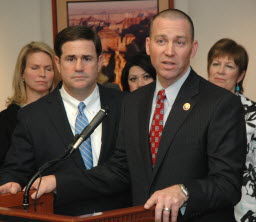Nearly 600 pages of state guidelines have been reviewed, and in some cases revised, on behalf of Arizona’s children.
But will the Department of Child Safety’s new rules help with the state’s overwhelming child welfare crisis?
With more than 17,000 children in out-of-home care, that’s key for child welfare advocates like Dana Wolfe Naimark, chief executive officer of the Arizona’s Children’s Action Alliance.
“My big question is, ‘Do they think these rules will help them focus their time and energy where it needs to be focused,’“ she said.
Yes, said DCS spokesman Doug Nick.
Earlier this week, DCS filed several chapters of its new rules package with the Secretary of State’s Office. The department will provide direct links to the new rules, at www.azsos.gov/rules, as they are published in the Arizona Administrative Register.
Naimark said the process did include several opportunities for public input as well as assurances that a community advisory board will be part of key future decisions, such as what response times should be when hotline calls are taken. DCS’ strategic plan calls for several objectives related to the hotline to be developed through this next fiscal year. (Learn more at dcs.az.gov/news/dcs-strategic-plan).
But Naimark said she was disappointed more wasn’t done to assure that reasonable efforts would be make to provide in-home help and alternatives before removing a child from home.
“So many agree that we are taking too many kids into foster care. If we could strengthen in-home services, many more children could be safe at home,” she said. “The rules are like law and lay the framework, and we feel the framework should be very clear.”
Nick didn’t respond directly on the new rules related to in-home services, but said there has been considerable progress as far as providing those services to families who have been selected to receive them.
“Even prior to the completion of the rules process, we started to see some significant improvement in this area,” Nick said. “DCS took assertive action in making this part of the strategic plan, tracking the issue, and focusing attention with internal staff and community providers — many of whom are adding staff — and the waitlist has dropped dramatically.”
Those waiting for in-home services went from a high of 1,157 families on Oct. 9 down to 729 families on Nov. 6, he said.
Naimark and Nick agreed that one significant, positive change comes from new rules allowing foster parents greater latitude in making decisions about how children use their leisure time.
Often, Naimark said, foster parents are reluctant and afraid to let children in their care do certain things other children take for granted, such as having friends over after school, going to the mall or having a sleepover.
“This is part of a whole movement to promote more normal childhood environments,” she said.
A couple more changes Nick said are worth noting include investigations and matters regarding independent living.
With investigations, changes include removing outdated terminology and adding details to the department’s methods to investigate reports of child abuse or neglect, such as required contacts, information to review and who to interview. It also “memorializes the coordination with law enforcement for reports containing criminal conduct allegations, and describes the department’s required documentation of case findings and written notification to parents, guardians, or custodians of the investigation outcome.”
With respect to independent living, these are new rules, and they emphasize the importance of “youth-directed” planning. Also, they provide flexibility to meet the individual needs of current and former foster youth, to better support youth with disabilities and special circumstances. And they provide time frames for completing planning and service tasks to ensure youth do not experience lags in services.
The reason for the rules update dates to when the DCS was created, in May 2014. At that time, state lawmakers included an exemption to allow DCS to draft its own rules that would make it a free-standing agency instead of still being part of the Department of Economic Security. The rules package needed to be submitted by Nov. 28.
Initially, public comment was open for 30 days on all rules, and two public hearings were held on each of the rule packages, one in Phoenix and one in Tucson. The DCS also accepted comments via an online survey, email and mail. But some stakeholders said they weren’t notified about the process, and voiced their concerns in late August. After that, the DCS held five additional meetings, from September through November, Nick said.
Nick said much of what was done included changing outdated language and updating the agency’s name.





